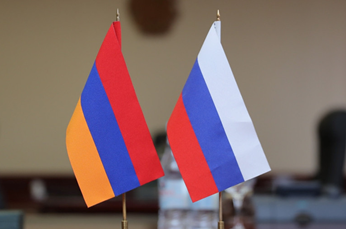
Under Prime Minister Nikol Pashinyan, the Armenian government has been articulating its desire to distance itself from Russia. Such a possibility requires nuanced consideration. Moving away from its dependence on Russia could benefit Armenia's long-term security, but only if it strengthens its position through genuine self-reliance. A prerequisite for that is improved regional relations, including but not limited to a comprehensive peace treaty with Azerbaijan.
By Robert M. Cutler
The difficulty arises from appearances that the intent behind this departure may be to leverage Western support against Azerbaijan. Such a motive would risk undermining the security of the Armenian state, which hinges on sustainable peace and stability.
For this to happen, it would be necessary to establish genuine and autonomous good-neighbourly relations with Azerbaijan and Turkey rather than rely on any external power—whether Russia or any other "mediator"—to intervene in regional conflicts diplomatically or militarily.
Contrary to allegations that Russia abandoned Armenia before the Second Karabakh War, evidence indicates ongoing support. Following the July 2020 clashes that preceded the war that autumn, and even during the clashes, reports surfaced of nine Russian flights delivering military supplies to Armenia. Flight activity increased in the run-up to the war, which started in late September that year. Over 510 tonnes of military cargo were transported to Armenia from Russia.
After Azerbaijan's President Ilham Aliyev raised concerns with President Vladimir Putin about these shipments, Russia’s Defence Minister Sergei Shoigu explained that the cargo was for construction at Russia’s Gyumri military base. However, many remained unconvinced by this claim, especially after the shock to the Azerbaijani public and elite opinion over Russian deliveries that July.
Armenia's strategic partnership with Russia is not just a policy but a defining element of its post-Soviet era. This partnership, characterised by deep military cooperation, geopolitical alignment, and economic and security dependence, carries significant weight in Armenia's international relations and military strategy.
This strategic partnership is formalised as a military alliance through membership in the Collective Security Treaty Organisation (CSTO) and as an economic alliance through membership in the Eurasian Economic Union (EAEU). With these ties in place, Armenia has positioned itself as a crucial ally in extending Russia's influence in the South Caucasus.
From 2011 to 2020, Russia was Armenia's predominant arms supplier. According to the authoritative Stockholm International Peace Research Institute (SIPRI), Russia accounted for at least 94 per cent of Armenia’s arms imports during the decade.
The weapons systems concerned included armoured personnel carriers, air defence systems, multiple rocket launchers and tanks. All these weapons were deployed against Azerbaijan by Armenia during the Second Karabakh War in late 2020.
A notable example of this close military cooperation was Armenia's erstwhile Defence Minister Arshak Karapetyan's attendance at an August 2021 defence exhibition in Moscow, where he met the Director of the Russian Federal Service for Military-Technical Cooperation, Dmitry Shugayev, and the Director of Rosoboronexport, Alexander Mikheyev.
At these meetings, the entire spectrum of Armenian-Russian military-technical cooperation was discussed, illustrating the persistence and comprehensiveness of the bilateral military alliance.
Over the years, Russia has provided Armenia with most of its military equipment, extensive financial support, and logistical aid. Armenia has reciprocated by demonstrating a consistent and robust diplomatic allegiance to Russia on such critical international issues as the illegal annexation of Crimea. Despite occasional accusations from Armenia alleging Russian neglect, the evidence points to a sustained strategic partnership.
For example, Russia increased its deliveries of military equipment and ammunition to Armenia after the military clashes with Azerbaijan in s 2016. Armenia allegedly used Smerch rockets, delivered by Russia between 2016 and 2017, to attack the civilian populations of the Azerbaijani cities of Barda and Ganja, resulting in more than 40 deaths.
Iskander surface-to-surface missiles, which have a range of 300 kilometres and were a critical component of this arsenal, reportedly struck Azerbaijani territory well behind the front lines during the Second Karabakh War in 2020. They also targeted the key strategic city of Shusha, which Armenian forces had occupied and which is also Azerbaijan’s historical cultural capital.
Russia habitually sells its military systems to Armenia at the domestic Russian price rather than at its international price for foreign buyers. For this purpose, Russia typically provides the Armenian government with low-interest loans. Since 2020, it has provided at least $300 million in loans to replenish Armenia’s military arsenal, and discussions are underway to increase this amount.
Armenia’s relations with Russia have only grown stronger over three decades, and they are not limited to Yerevan's membership in CSTO and EAEU. Further, Russian state companies dominate the entire Armenian economy, from the transport sector (the Armenian state railroad company is a wholly-owned subsidiary of the Russian one ) to the energy sector (where one Russian state trust owns Armenia's gas-distribution system and another manages the Metsamor nuclear power-plant), to the banking sector and beyond.
Moreover, military relations between Armenia and Russia are governed by a bilateral state treaty that runs until 2044, which Armenia cannot unilaterally renounce. The terms of this treaty state that it may be cancelled only if both sides agree. The Russian military base at Gyumri, which has been there for seven decades, currently hosts 3,000 Russian soldiers. Five miles from central Yerevan, at Erebuni Airport, one finds another air base with a squadron of attack helicopters.
Further, the Border Guard Service of the Russian FSB has responsibility for most of Armenia’s international borders. In addition, Russia has been integrating Armenian armed forces into the structure of its Southern Military District, including the formation of joint Russian-Armenian ground forces. The two countries’ air defence systems have been unified for some time, with Russia having security responsibility for Armenian airspace.
In 2019, Pashinyan deployed a mission to Syria following a 2018 meeting with Russia’s President Vladimir Putin, allegedly for humanitarian purposes but which, in fact, included military personnel. In May 2021, Pashinyan inaugurated two deployments from the Gyumri base into southern Armenia, specifically the Syunik region. This region is located between the main body of Azerbaijan and its exclave, Nakhchivan, and includes the strip of land sometimes called the “Zangezur corridor.”
It is hardly an exaggeration to say that Armenia's strategic decisions have entrenched it as a vassal state under Russian dominance, severely compromising its sovereignty and autonomy. As explained above, Armenia’s dependence on Russia permeates the country's entire life through military, economic and diplomatic modalities. The Armenian people and their state suffered for a quarter-century, from the mid-1990s until the end of the 2010s, under irredentist Karabakhi influence.
This malign authority—abetted and compounded by self-seeking leaders of the Armenian diaspora (above all in France and the United States)—tragically and consistently prioritised Russian interests over its national autonomy. Armenian society and politics today suffer from having, for so long, relinquished a striving for genuine self-determination and aligned its policies and actions so directly with Moscow.
Armenia's subservience to Russian interests undermines its ability to act independently globally. Notwithstanding European and especially French attempts to infiltrate their influence into the Armenian space for their own reasons, Yerevan remains effectively a proxy for Russian influence in the South Caucasus. The short-term security benefits come at a considerable cost to Armenia.
They have resulted in the country's strategic options being limited, and despite recent appearances, its ability to pursue an independent foreign policy remains largely compromised. A side effect has significantly damaged Armenia's international prestige and credibility.
France and other powers that wish to be involved (such as the European Union and the United States) should consider Armenia's genuine security needs and refrain from exploiting them as a geopolitical tool. Unfortunately, their current approach tends to deepen divisions in the South Caucasus. This does not foster stability but instead risks exacerbating regional tensions.
Suppose such powers insist on using Armenia as an instrument to further their strategic interests, as Russia and Iran have always done. In that case, they will only initiate a new cycle of conflict and mistrust. This would undermine Armenia’s long-term security, not to mention the prospects for peace in the region. A more constructive policy would be a focus on encouraging dialogue and cooperation between Armenia and its neighbours rather than perpetuating adversarial dynamics.






